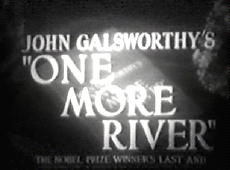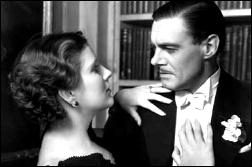Sat 6 Feb 2010
A Movie Review by Walter Albert: ONE MORE RIVER (1934).
Posted by Steve under Films: Drama/Romance , ReviewsNo Comments
ONE MORE RIVER. Universal, 1934. Colin Clive, Diana Wynyard, Jane Wyatt, Mrs. Patrick Campbell, James Lawton, Henry Stephenson, C. Aubrey Smith, Henry Daniell, E. E. Clive, Snub Pollard. Script: R.C. Sherriff, from the novel by John Galsworthy. Director: James Whale.

When Diana Wynyard leaves her caddish, sadistic husband, sneeringly played by Colin Clive, to establish an independent existence, private detectives report her every move (in particular, a compromising night in the country in a disabled car with friend and would-be lover James Lawton) to Clive, who sues her for divorce on grounds of adultery, naming Lawton as co-respondent.
Apart from the casting of his Dr. Frankenstein (Colin Clive) and the usual impeccable direction of a fine and varied cast, the materials of this absorbing melodrama seem somewhat remote from Whale’s imaginative masterpieces: The Old Dark House; The Invisible Man; and Bride of Frankenstein.
However, three brief sequences are reminiscent of those stylish films:
● Wynyard pulls her hair up into a striking semblance of the Bride’s electrified coiffure.
● A low-angle shot catches E. E Clive looking superciliously toward the bottom of the frame with Dr. Praetorius’s prissy, pursed lips (Bride).

● And most moving of all, Mrs. Patrick Campbell, slowly climbing an ornate, moodily lighted staircase (not unlike the staircase in the great hall of Baron Frankenstein’ s castle), spectrally intones Lady Macbeth’s exit line, “What’s done cannot be undone. To bed, to bed, to bed,” in a cameo scene that sums up unforgettably Whale’s unique feel for the extravagantly theatrical and sardonic, self-conscious mockery.
The courtroom scene is splendidly acted and paced and the unlikely team of E.E. Clive and Snub Pollard, playing comic sleuths, is a delight. Finally, Diana Wynyard gives an effortless, understated performance that seems spontaneous and lends credibility to this contemporary story of a rebellion against a class and its taboos, a subject always of great interest to Whale.